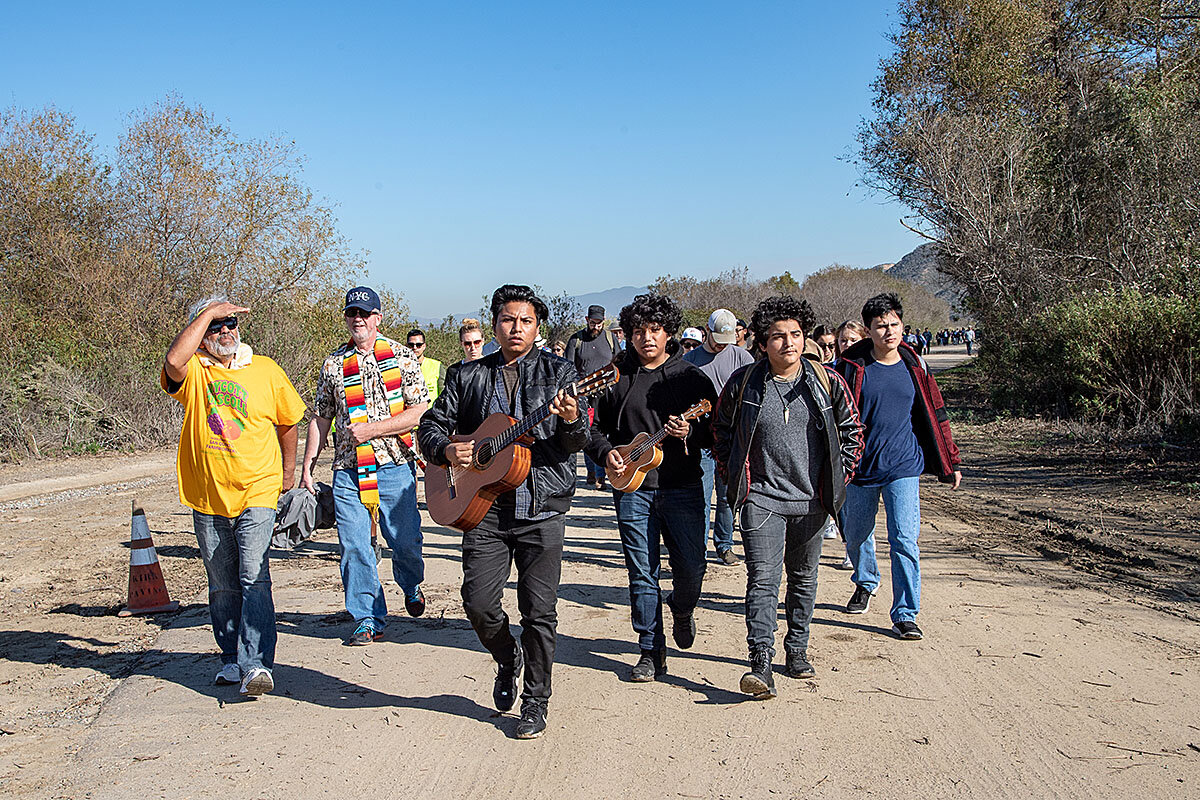When the Oslo Accords were signed 25 years ago, it seemed Israelis and Palestinians might be headed toward peace. Haifa’s December festival began that year too, a reminder of a time of hope.

Why is Christian Science in our name?
Our name is about honesty. The Monitor is owned by The First Church of Christ, Scientist, and we’ve always been transparent about that.
The church publishes the Monitor because it sees good journalism as vital to progress in the world. Since 1908, we’ve aimed “to injure no man, but to bless all mankind,” as our founder, Mary Baker Eddy, put it.
Here, you’ll find award-winning journalism not driven by commercial influences – a news organization that takes seriously its mission to uplift the world by seeking solutions and finding reasons for credible hope.
Explore values journalism About usMonitor Daily Podcast
- Follow us:
- Apple Podcasts
- Spotify
- RSS Feed
- Download
For this Christmas Eve edition, we offer you a special audio presentation.
Here’s how to listen:
If you’re reading the Daily in our email format, you’ll need to click through to the full web-based version. Do that by clicking on the headphones icon at the top, or click on any story in the email – and then scroll to the audio controls at the bottom. If you’re already on the web version, then you’re all set!
Here’s the bonus you’ll find there today: Four of our editors read excerpts from their favorite holiday stories.
Please enjoy this offering. And Merry Christmas.
Now, to our five featured stories for today.
Already a subscriber? Log in
Help fund Monitor journalism for $11/ month
Monitor journalism changes lives because we open that too-small box that most people think they live in. We believe news can and should expand a sense of identity and possibility beyond narrow conventional expectations.
Our work isn't possible without your support.
Today’s stories
And why we wrote them
( 12 min. read )

( 6 min. read )
How deep was the US commitment to its allies in Syria? That question has been asked all along. The Kurds and others knew President Trump favored a US withdrawal. Still, the timing came as a surprise.
Briefing
( 5 min. read )
The latest government shutdown hinges on a single issue: border wall funding. But as Congress grows more divided and compromise becomes increasingly scarce, lawmakers may increasingly turn to shutdowns as a negotiating tool.
( 6 min. read )
International traditions are commonly adapted to new environments via migration and globalization. In California, the ritual of La Posada, which reenacts Joseph and Mary’s search for shelter, has taken on new meaning in a time of increased of anti-migrant rhetoric.
( 4 min. read )
Like hanging treasured ornaments and decorating gingerbread, for millions of Americans the annual lighting of the Rockefeller Center Christmas tree is a beloved tradition and a comforting symbol of the holidays.
The Monitor's View
( 3 min. read )
He had a lot to weigh him down. His wife had died in a tragic fire just three years earlier. The Civil War had been raging for more than two years with no end in sight. Against his wishes, his oldest son, Charles, just 17 years of age, had left their Cambridge, Mass., home in March to enlist in the Union army. In November, Charles had been severely wounded in a battle. Now the boy was back living with his father, attempting to recover.
Christmas 1863 wasn’t a happy time for American poet Henry Wadsworth Longfellow.
Yet when Longfellow put pen to paper that December what came forth was “Christmas Bells,” a poem later set to music that was to become one of the most deeply inspiring American Christmas carols.
In it Longfellow hears church bells that ring out “peace on earth, good-will to men!” But he finds himself doubting that could possibly be true.
And in despair I bowed my head;
‘There is no peace on earth,’ I said;
‘For hate is strong, And mocks the song
Of peace on earth, good-will to men!’
But as bells began to peal “more loud and deep,” his thought shifted, and his mood lifted:
The Wrong shall fail,
The Right prevail,
With peace on earth, good-will to men!
Much of today’s news isn’t pretty either: In the United States, the federal government is partially shut down and the stock market wobbles ominously. Elsewhere a surprise tsunami has created a major disaster in Indonesia; warfare drags on in Syria, Afghanistan, and elsewhere; and political uncertainties and tensions span the globe.
Long before Christmas became a Christian holy day celebrating the birth of Jesus, the ancient Roman winter solstice of Saturnalia had been celebrated in late December. The burning of bright lights pushed back the darkness of the long nights; decorations of wreaths and other greenery were a reminder that the rebirth of spring would come again.
In the 21st century displaying bright and colorful lights and decorating evergreen trees are still part of the season, along with other ancient customs such as holding festive parties and giving gifts.
Gathering with family and friends is still a welcome winter respite.
But for those seeking deeper meaning there’s much more to Christmas, even for those who don’t think of themselves as Christian. A profound, heart-stirring message lies in the story of the lowly child, whose birth symbolizes innocence, purity, and fond hope for a better future. Some have seen a poignant connection between the circumstances of the infant Jesus and his parents, who had to flee from Bethlehem to Egypt to escape his death at the hands of King Herod, to the plight of young refugee and migrant families around the world today.
Longfellow didn’t find peace breaking out immediately after he heard the Christmas bells ringing. But peace did come, in the spring of 1865. Meanwhile, young Charles Appleton Longfellow, who never rejoined the army, recovered his health and spent the next several decades traveling the world.
Today it may take some careful listening to hear the bells’ message that right will prevail. But people of goodwill anywhere can carry it in their hearts.
A Christian Science Perspective
Each weekday, the Monitor includes one clearly labeled religious article offering spiritual insight on contemporary issues, including the news. The publication – in its various forms – is produced for anyone who cares about the progress of the human endeavor around the world and seeks news reported with compassion, intelligence, and an essentially constructive lens. For many, that caring has religious roots. For many, it does not. The Monitor has always embraced both audiences. The Monitor is owned by a church – The First Church of Christ, Scientist, in Boston – whose founder was concerned with both the state of the world and the quality of available news.
( 1 min. read )
In this poem, the author reflects on the deep significance of that special night on which Jesus was born, heralding the redeeming activity of the Christ.
A message of love
A look ahead
We won’t be publishing tomorrow, Christmas Day. To bookend today’s readings – available in the audio edition of this Daily – the Monitor’s April Austin reflects on her own annual tradition: a re-reading of Dickens’s “A Christmas Carol.” See you Wednesday.









